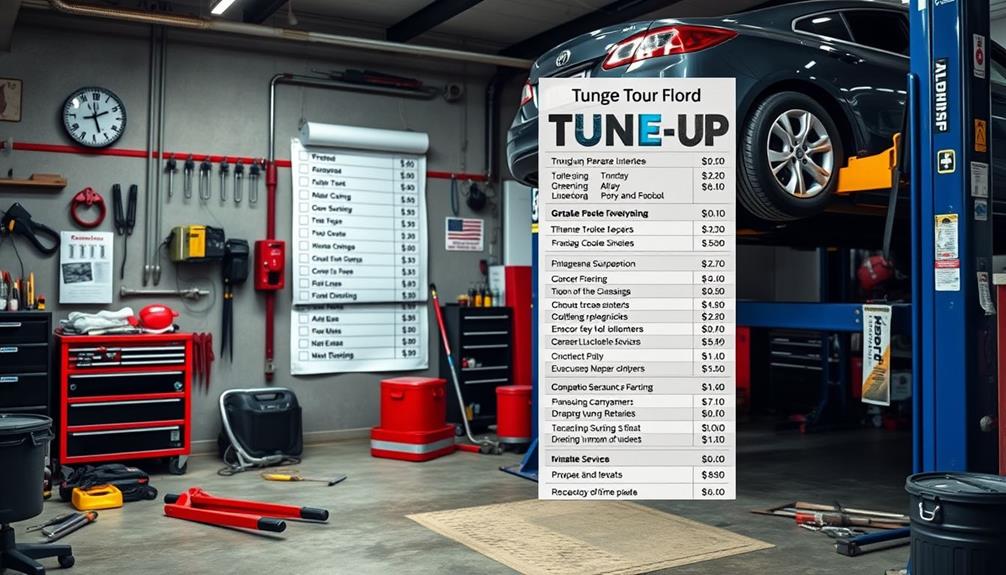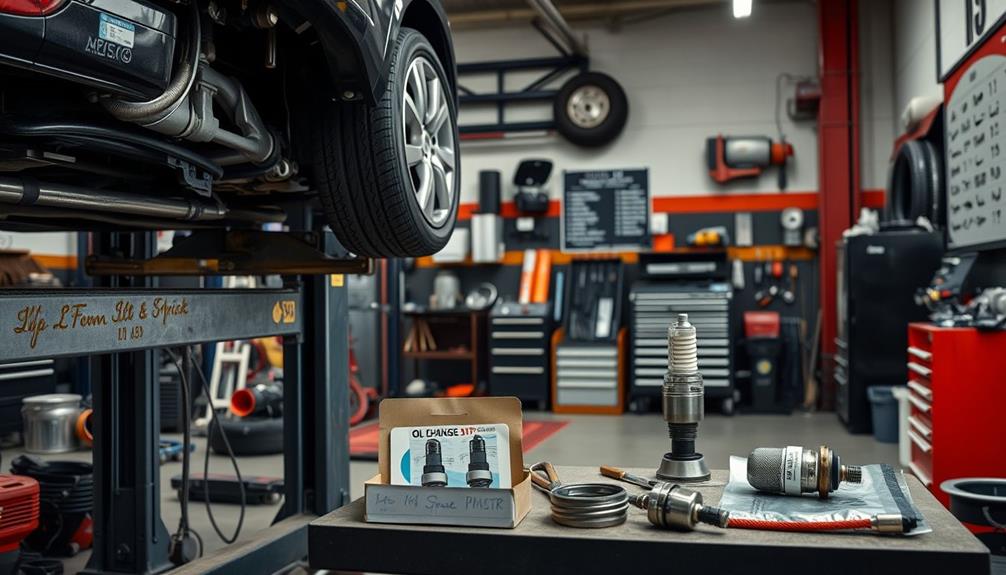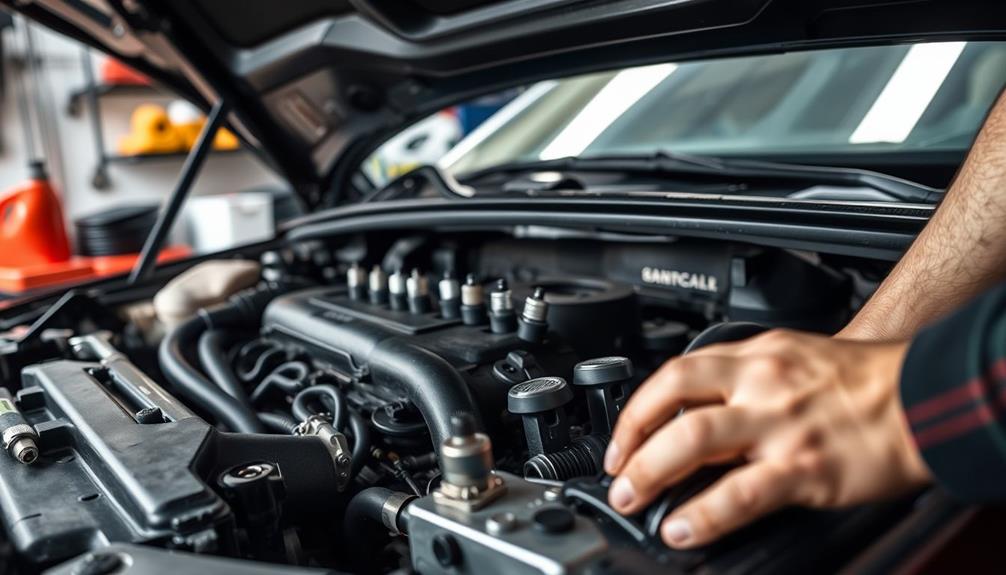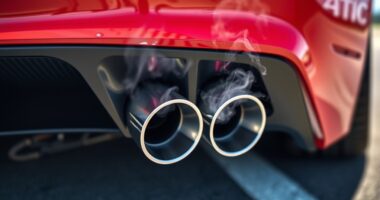A car tune-up usually costs between $40 and $800, depending on the complexity of the services you need. If you're getting a basic tune-up, expect to pay around $40 to $150 for essentials like spark plug replacement. For more detailed services, the price can climb to $200 or more, especially for older or luxury vehicles. Factors like your car's age, type, and the labor rates in your area can also affect the costs. Understanding these factors can help you budget wisely. Keep going to discover tips on what to watch for and how to choose the right mechanic!
Key Takeaways
- Basic tune-ups typically cost between $40 and $150, focusing on spark plug replacement and essential inspections.
- Detailed tune-ups can range from $200 to $800, including oil changes and comprehensive system checks.
- Older vehicles may incur costs between $150 and $600 due to more extensive maintenance needs.
- Labor rates vary by location, with independent mechanics often offering lower prices than dealerships.
- Comparing quotes from different service centers can help manage expenses effectively.
Definition of a Tune-Up
What exactly is a tune-up? A tune-up is a crucial maintenance service aimed at boosting your vehicle's performance and efficiency. During this process, key parts like spark plugs and filters are inspected and often replaced. It's recommended you get a tune-up every 30,000 to 100,000 miles, depending on your car's make and model.
In a typical tune-up, your ignition system, air filters, fuel filters, and important belts and hoses are assessed for wear and functionality. Basic tasks usually include changing spark plugs and air filters, while more extensive services might involve additional inspections and replacements. This isn't just about keeping your car running; it's about proactive car care.
Performing a tune-up can lead to improved fuel economy and reduced emissions. Plus, it helps you catch potential issues early, saving you from more costly repairs down the line.
Think of a tune-up as a form of preventive maintenance that guarantees your vehicle stays in top shape. By prioritizing this service, you're investing in the longevity and reliability of your car.
Average Cost of Tune-Ups
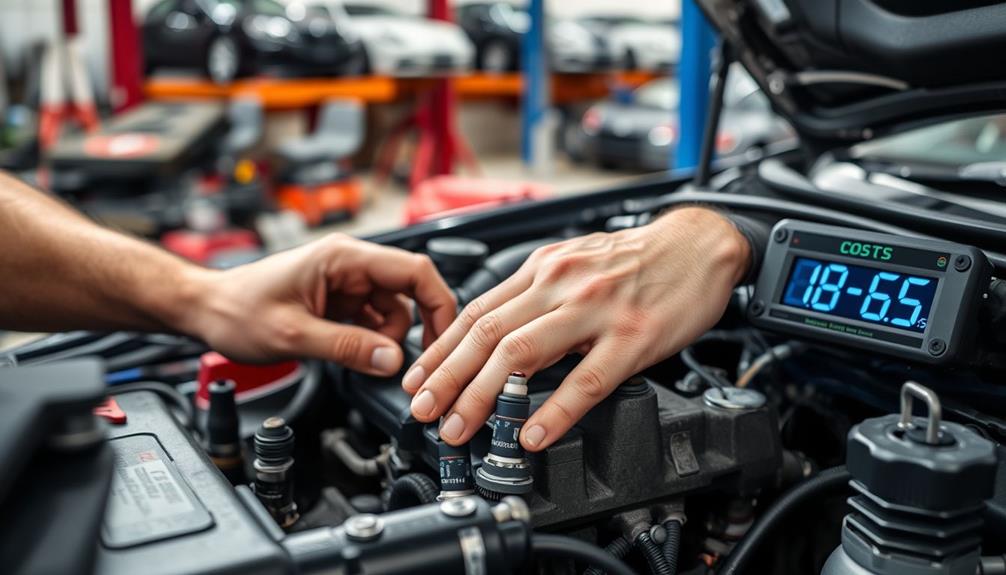
Getting a tune-up can set you back anywhere from $40 to $800, depending on the complexity of the service and your vehicle's specific needs. The average cost of tune-ups varies considerably based on the type of service and the age of your vehicle.
Here's a quick breakdown to help you understand:
| Tune-Up Type | Price Range | Services Included |
|---|---|---|
| Basic Tune-Up | $40 – $150 | Spark plugs replaced, basic inspections |
| Detailed Tune-Up | $200 – $800 | Oil changes, system checks, extensive maintenance |
| Older Vehicles | $150 – $600 | More extensive maintenance, often needed for vehicles over 120,000 miles |
For a standard vehicle, the average cost of a basic tune-up is around $384, especially for models like the Honda Accord. However, if you own an older vehicle, be prepared for higher costs, as they often require more maintenance. Whether you're opting for a basic or detailed tune-up, understanding these costs can help you budget effectively for your car's health.
Factors Affecting Tune-Up Prices
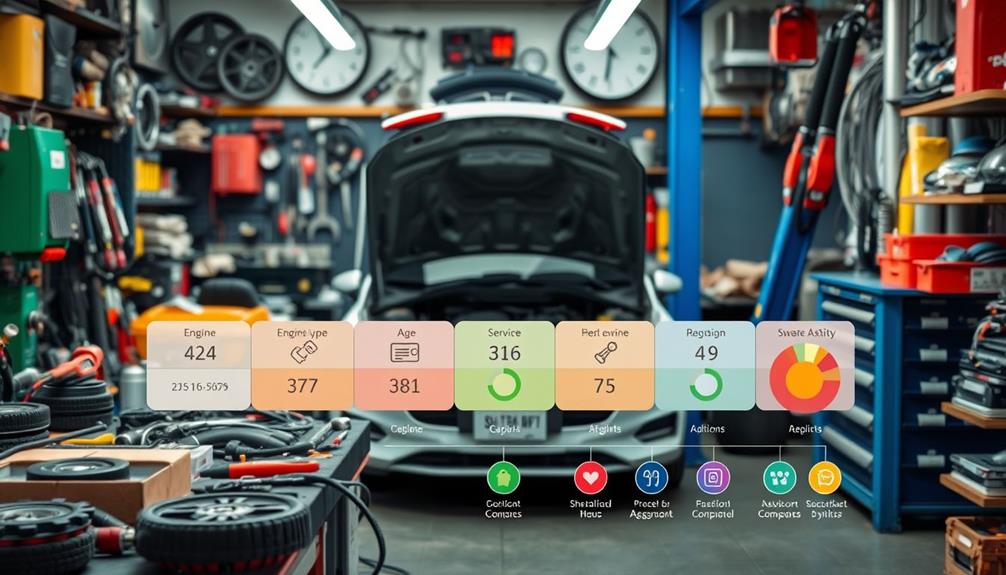
When you're considering a tune-up, several factors can impact the price you pay.
Your vehicle's type and age, local labor rates, and the specific services you need all play a significant role in determining costs.
Understanding these factors can help you make informed decisions and potentially save money.
Vehicle Type and Age
Vehicle type and age play essential roles in determining tune-up costs, impacting both the frequency and complexity of maintenance required. If you drive an older car, you'll likely face higher expenses due to the need for more frequent maintenance and a greater number of components needing attention.
Vehicles with over 120,000 miles often incur increased tune-up costs, as wear and tear can necessitate additional services like timing belt replacements or extensive system inspections.
Luxury and high-performance vehicles tend to have more complex engines and specialized parts, leading to elevated labor rates and parts costs during tune-ups compared to standard vehicles.
Additionally, the make and model of your vehicle can considerably influence tune-up prices; foreign models typically come with higher parts and service costs than domestic ones.
For older or classic cars, thorough tune-ups can range from $200 to $800, reflecting the extra labor and parts required to keep these vehicles in top shape.
Understanding how your vehicle type and age affect maintenance costs will help you budget more effectively for necessary tune-ups.
Local Labor Rates
Tune-up costs can vary greatly based on local labor rates, which are influenced by several factors.
First, your geographic location plays a vital role. For instance, rates in metropolitan areas like Detroit typically range from $40 to $90 per hour at standard shops, while dealerships charge between $80 and $150. In contrast, you might find lower labor costs in rural areas, making tune-ups more budget-friendly.
Additionally, specialty vehicle maintenance can notably increase labor costs. If you own a luxury or complex vehicle, expect to pay a premium for the expertise required to service it properly. This means that even if you're in a low-cost area, the nature of your vehicle can drive up your expenses.
To save money, it's wise to compare local labor rates across different shops. Doing so helps you find the most affordable options for your tune-up services.
Scope of Services
The scope of services included in a tune-up can greatly impact your overall costs. A basic tune typically ranges from $40 to $150 and focuses on essential tasks like spark plug replacement and ignition system inspection.
On the other hand, a full tune involves more extensive services, such as oil changes and system checks, which can set you back anywhere from $200 to $800. The type and age of your vehicle, along with its engine complexity, play significant roles in determining these costs.
Additionally, geographic location and local labor rates can further influence the price you pay. For instance, classic or older vehicles often require more specialized attention, leading to higher costs.
To manage your expenses effectively, compare quotes from different service centers to understand the typical costs in your area.
Don't forget to factor in the cost of parts, as they can vary widely. In the end, being informed about the scope of services helps you make better decisions regarding your car's overall maintenance and guarantees you're not blindsided by unexpected expenses.
Components Included in Tune-Ups
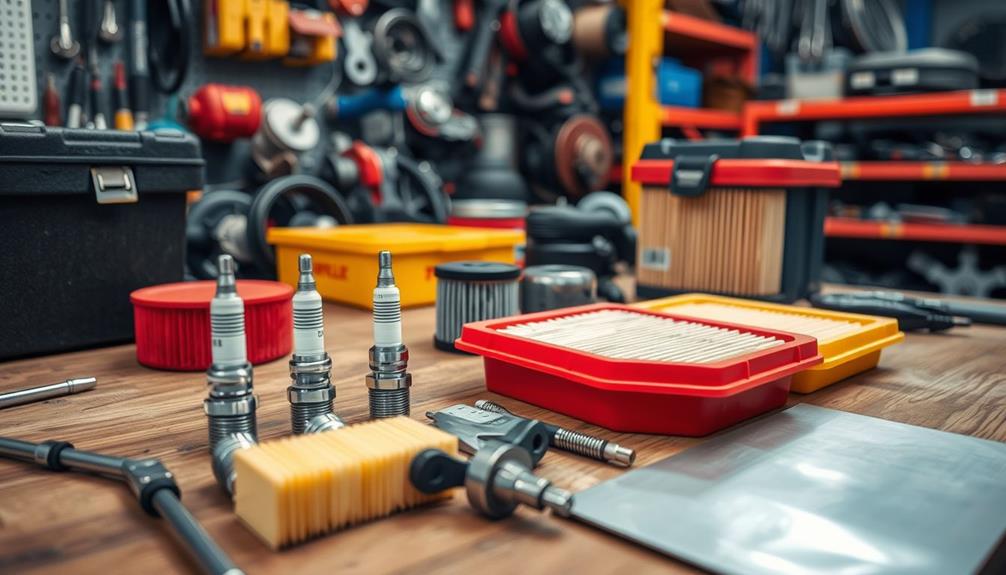
When it comes to maintaining your car's performance, understanding the components included in a tune-up is crucial. A basic tune-up typically focuses on key parts that directly influence engine efficiency. Here's a breakdown of what you can expect:
| Component | Description | Importance |
|---|---|---|
| Spark Plugs | Ignite the air-fuel mixture | Critical for engine firing |
| Air Filters | Clean the air entering the engine | Improves combustion efficiency |
| Fuel Filters | Filter impurities in fuel | Protects the fuel system |
| Ignition Coils | Transfer electrical energy | Key for spark generation |
A thorough tune-up may also include inspections and replacements of additional components like distributor caps, rotors, and PCV valves. If you're driving an older vehicle, especially one that's over 120,000 miles, these components often need more frequent attention. A professional mechanic will also perform diagnostic checks during the tune-up to guarantee your fuel and ignition systems are working seamlessly. By understanding these components, you can better appreciate the significance of regular tune-ups for your vehicle.
Signs Your Car Needs a Tune-Up
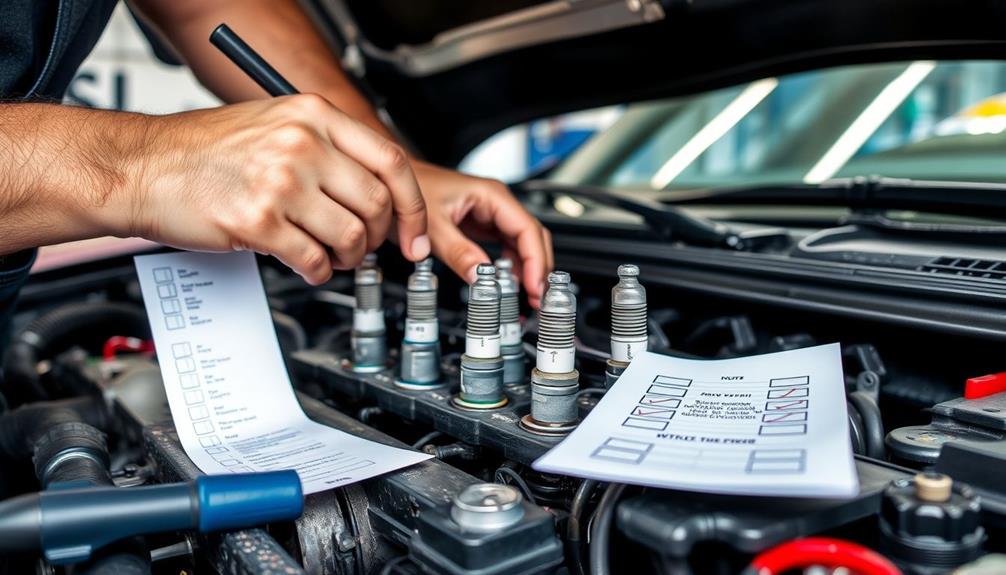
If you're noticing a drop in your gas mileage, it might be time for a tune-up, as worn parts can really affect fuel efficiency.
Additionally, if your Check Engine Light is on, don't ignore it; that warning could point to issues that require immediate attention.
Keeping an eye on these signs can help maintain your car's performance and save you money in the long run.
Decreased Fuel Efficiency
Noticing a drop in your gas mileage? This could be a sign that your car needs a tune-up. Decreased fuel efficiency often results from worn spark plugs or clogged air filters, both of which can considerably reduce your engine's performance.
If you're experiencing rough idling or stalling, it's time to pay attention.
Studies indicate that maintaining peak engine performance through regular tune-ups can boost your fuel economy by as much as 4% to 40%, depending on your vehicle's condition. Ignoring these signs can lead to more severe engine problems, ultimately resulting in costly repairs.
You might also see the Check Engine Light activate, which often signals issues that affect fuel efficiency. While it may seem harmless, this warning can indicate underlying problems that require immediate attention.
Addressing decreased fuel efficiency promptly with a tune-up not only helps your car run smoother but also saves you money at the pump.
Check Engine Light
The Check Engine Light (CEL) often serves as your car's way of communicating that something isn't quite right, signaling you to pay attention. When the CEL illuminates, it's usually a primary indicator that your vehicle may need a tune-up. Ignoring this light can lead to decreased engine performance and reduced fuel efficiency, which can escalate into more costly repairs if the underlying issues worsen.
To pinpoint the problem, you should consider scheduling diagnostic tests as soon as the CEL activates. These tests can reveal a range of issues, from minor sensor malfunctions to significant mechanical failures.
Regular monitoring of the CEL, along with other warning lights, can help you prevent serious engine problems and maintain peak vehicle performance.
Addressing the Check Engine Light promptly not only enhances your vehicle's lifespan but also guarantees compliance with emission regulations. This proactive maintenance ultimately benefits both your wallet and the environment.
Benefits of Regular Tune-Ups
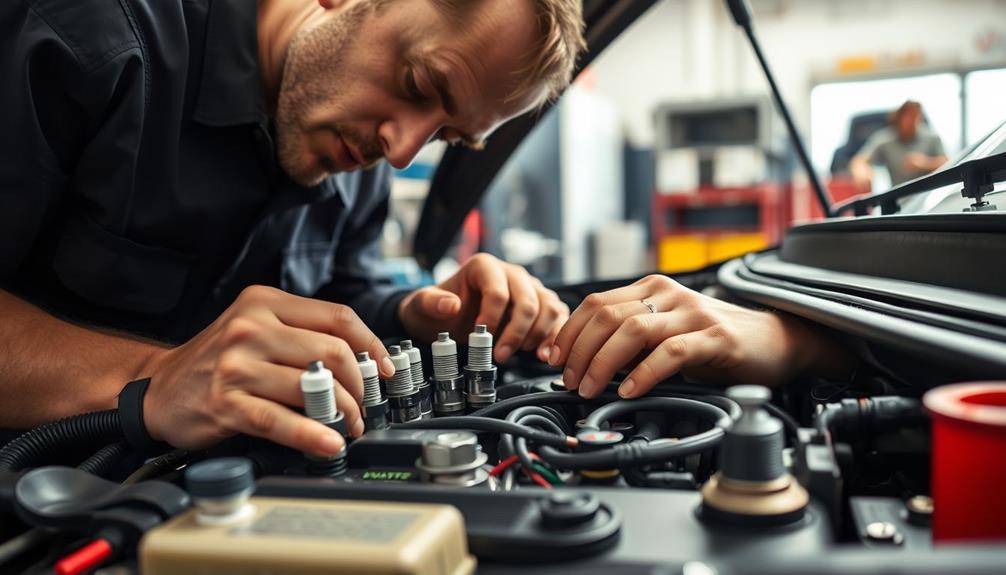
Maximizing your vehicle's performance hinges on regular tune-ups, which provide numerous benefits that enhance your driving experience. When you prioritize scheduled maintenance, you not only keep your car running smoothly but also enjoy significant advantages in various areas.
- Improved performance: Regular tune-ups enhance engine responsiveness, leading to a smoother ride and better handling.
- Better fuel economy: Keeping components like air and fuel filters clean guarantees your vehicle operates efficiently, saving you money at the pump.
- Preventative inspections: A thorough tune-up helps identify minor issues before they escalate into costly repairs, protecting your investment.
- Increased longevity: Sticking to a consistent tune-up schedule can prolong your vehicle's lifespan, maximizing the benefits of your initial purchase.
DIY Tune-Up Considerations
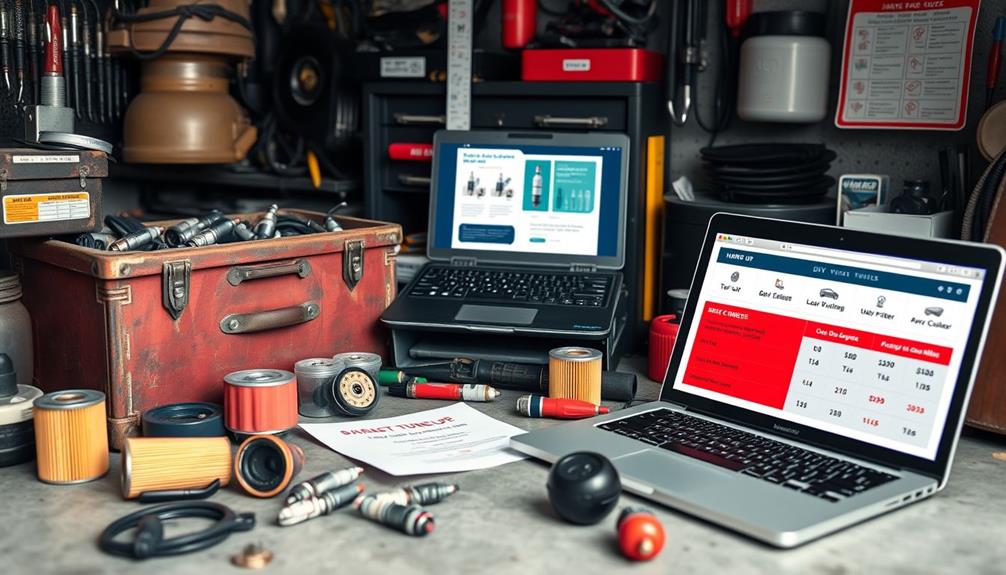
Taking on a DIY tune-up can be a rewarding experience that saves you money and enhances your car's performance. With a typical cost of $25 to $100 for basic engine materials, you'll find it notably cheaper than professional services, which can start at $50 and soar to $200 or more.
Many people successfully handle basic maintenance tasks, including spark plug replacement and air filter changes, leading to considerable cost savings.
Before diving in, it's important to consult your vehicle manuals. They offer specific instructions tailored to your car, ensuring you follow proper procedures.
Remember, while DIY tune-ups can cover many routine tasks, more complex diagnostics might require professional assistance.
Don't overlook safety precautions. Wearing gloves and safety glasses is essential while working on your vehicle to prevent injuries.
Choosing a Mechanic for Tune-Ups
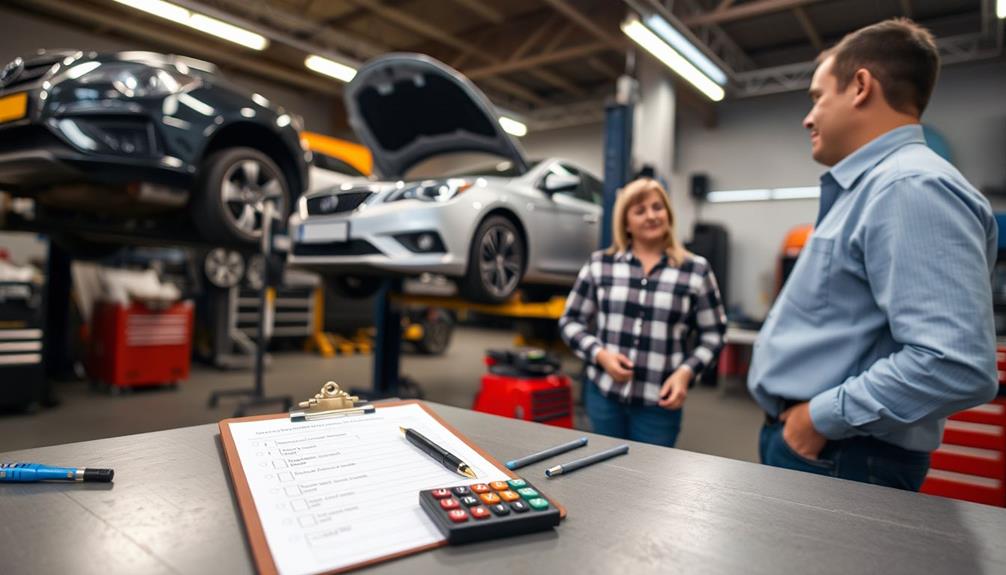
Selecting the right mechanic for your tune-up can greatly impact your car's performance and your budget. To guarantee you're making the best choice, it's important to do your homework.
Start by comparing quotes from different shops, as tune-up costs can vary considerably. Basic services may range from $40 to $150, while extensive options can soar from $200 to $800.
Here are a few tips to help you choose a reputable mechanic:
- Look for independent mechanics; they often provide lower rates than dealerships.
- Check customer reviews and recommendations for insights into service quality.
- Request a detailed breakdown of the services included in the estimate to avoid unexpected costs.
- Verify the mechanic's experience with your specific vehicle make and model for tailored service.
Frequently Asked Questions
What Is the Average Cost of a Full Tune-Up?
The average cost of a full tune-up varies widely, typically falling between $200 and $800. It depends on your vehicle type and the specific services you need, so always compare quotes for the best deal. Some common services included in a tune-up are an oil change, air filter replacement, spark plug replacement, and a thorough inspection of vital systems. Additional costs may be incurred if your vehicle requires more extensive repairs. It’s important to factor in potential car tuneup costs when budgeting for regular maintenance to keep your vehicle running smoothly. Always consult with a trusted mechanic to determine the necessary services for your specific vehicle.
How Much Does It Cost to Fully Tune a Car?
You know the saying, "A stitch in time saves nine." Fully tuning your car can cost between $200 and $800, depending on services needed. Always compare quotes to find the best deal for your vehicle.
What Does a Full Tune-Up Include?
A full tune-up includes replacing air and fuel filters, spark plugs, and inspecting your ignition system, belts, and hoses. You might also get throttle body cleaning and fuel induction services to boost your engine's performance.
Is It Worth Getting a Car Tune Up?
Yes, getting a car tune-up's worth it. You enhance performance, improve fuel efficiency, and prevent costly repairs. Regular maintenance saves you money in the long run, ensuring your vehicle runs smoothly for years to come.
Conclusion
In the grand symphony of your car's life, a tune-up is the conductor, ensuring every part plays in harmony. By investing in this essential care, you're not just maintaining a vehicle; you're nurturing a trusted companion that carries you through life's journeys. So, listen to the whispers of your engine—embrace the rhythm of regular tune-ups to keep your drive smooth and your adventures alive. After all, every road deserves a well-tuned ride.
